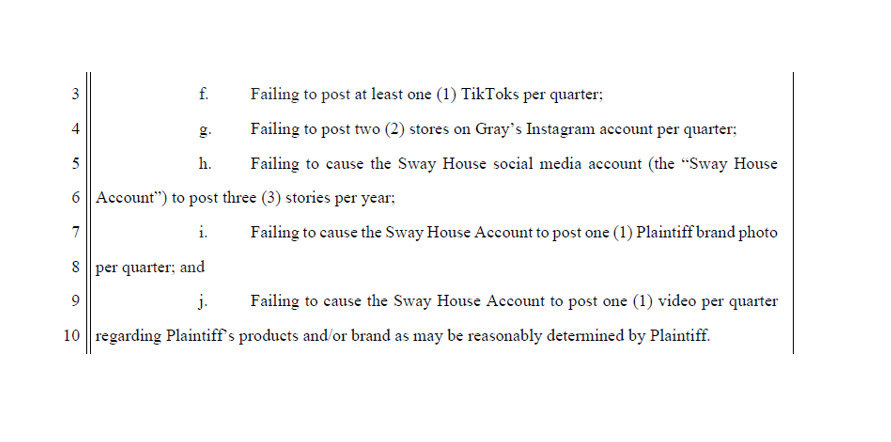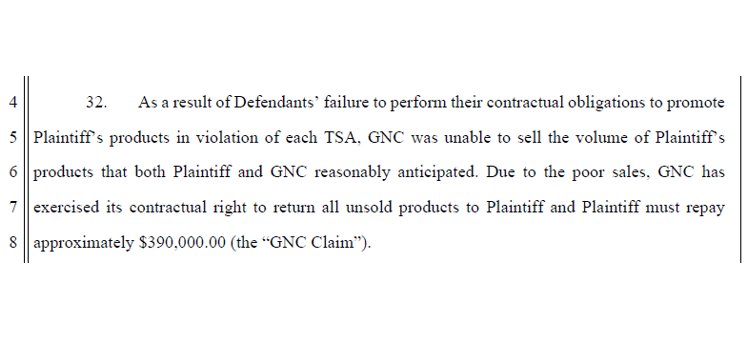Sway Fitness—a supplement brand “based on the Sway House”—is suing Blake Gray, Noah Beck, Bryce Hall, Griffin Johnson, and Josh Richards. Sway Fitness says the Sway House stars breached contracts by failing to create content supporting the brand and by promoting competitors.


Sway Fitness says the creators caused more than $500,000 in damages, including $390,000 of product that GNC ordered but could not sell.

Warner Music Group’s lawsuit against Iconic alleges that Iconic and its influencers used WMG’s copyright music without permission.
In total, WMG says Iconic has used more than 165 different copyrighted tracks owned by WMG across at least 169 videos. WMG says Iconic never sought to obtain licenses for the tracks.

Remember: Brands and influencers cannot used music from TikTok’s standard (i.e., non-commercial) music library for any sponsored content oar advertising without obtaining a license from whomever owns the rights to the music.
Platforms like TikTok and Instagram have licensing deals with big record labels that allow users to include music in videos, but those licenses don’t allow for commercial usage:

Bang Energy was found liable for this exact type of infringement in a case brought by Universal Music Group earlier this year.
The lesson: if you’re a brand or a creator, do not use music in sponsored content or advertising without clearing the rights. Damages for willful copyright infringement can be up to $150,000 per infringing act (i.e., per post)!
Francesca Witzburg:
Hey guys. Today I have Rob Freund who is an amazing attorney out in California who deals with all aspects of influencer advertising, marketing law. He also is a good friend of mine and we are doing this impromptu live today. So I ask, I like to do these periodically with Rob because he’s kind of on the other side of my practice. So he’s really an expert when it comes down to promotions, offers, influencers, marketing. There’s a whole body of law that you need to be aware of when you are selling and doing promotions online.
Hey Rob.
Rob Freund:
Hey, good morning.
Francesca Witzburg:
How are you?
Rob Freund:
I’m doing well, how are you?
Francesca Witzburg:
I’m good. I just gave you a lovely intro and I will repeat it cause I want you to hear <laugh>. Okay. This is Rob Freund. He’s an incredible attorney. He’s based in California. He advises on all aspects of influencers, marketing, advertising, promotions, and he is a good friend of mine and he owns Robert Freund Law and a lot of you follow him. We already have a ton of people in here, Rob, who are really excited to hear what you’ve been working on, what kind of issues you’ve been seeing and advising on. And I like to do these periodically because the law is evolving, especially with TikTok and Instagram. So we can get started with what I would say, what are the best practices right now for influencers who are doing promotions or sweepstakes online line?
Rob Freund:
Yeah, those are sort of related, but related issues that have different considerations. When you’re talking about giveaways and sweepstakes in particular, the answer to that sort of depends on whether the influencer has their own brand that they’re giving something away through that giveaway. So if you have your own beauty brand and you’re running a giveaway for your followers or something like that and you’re supplying the product, that’s sort of a different situation from if you’re a brand that’s reaching out to work with influencers to help promote your giveaway. From the influencer’s perspective, if they are not also the brand, if they’re just promoting some other advertiser, then the biggest issues that they wanna pay attention to are making sure that they’re complying with FTC rules about disclosing their connection to that advertiser. Whether it’s through sort of traditional influencer marketing, like. “I’m getting paid to make a post,” that requires a disclosure or “I’m getting free product or I’m getting a free sweepstakes entry even to post about something.”
All of those situations require that the influencer make clear to their audience that there is this material connection between them and the brand that needs to be disclosed. If they are promoting a sweepstakes, for example, like, such and such brand is giving away a Tesla and here’s how to enter and here’s how you can win and so on. That also requires a disclosure if the influencer is getting any kind of benefit from promoting that sweepstakes. So we can also talk about if you’re organizing and you’re the brand that’s promoting the sweepstakes, some of the issues that go into that. But in addition to disclosure compliance, it’s really important that influencers understand whatever contract they have with the brand that’s running the promotion. Particularly if you’re working with a sophisticated brand or one that at least is put some thought into their promotion, you’re gonna have an agreement with them about that covers the basics: How long is this promotion running? How are you getting paid? What kind of content are you being asked to create or is that gonna live? Who’s gonna own it? How long is it gonna be up? And things of that nature.
And where the disputes typically happen is around that usage and ownership issue. Either the influencer and the brand just didn’t have the same understanding of what some of those terms mean or what they intended. And it’s very common to just view the contract as something that’s like the last step before you get started and you don’t really need to pay close attention to it. But that’s sort of a long way of saying FTC disclosures and paying close attention to your agreements are probably the two most critical pieces of any kind of promotion from the influencer’s perspective.
Francesca Witzburg:
And are we still seeing disclosure issues? Have most influencers incorporated this with the tools that Instagram and TikTok offered making it really easy or are we still seeing violations of disclosure requirements?
Rob Freund:
I still see a lot of non-compliance. I don’t know if the data’s trending that there’s more or less, but you mentioned the tools that the platforms give. What’s interesting and kind of frustrating is that the FTC has said those tools aren’t good enough anyway. That’s annoying. So even if you were to use paid partnership with tool on Instagram with nothing more, you could still potentially have an FTC problem on your hands—more likely for the brand than for individual influencers. But I have seen recently some plaintiff’s lawyers trying to lump individual influencers as defendants in with the brand over these disclosure issues that I’ve just been talking about. So it’s still an issue. I think a lot of creators are still sort relying on the brand to tell them what to do, and they think, “well if I wasn’t getting paid for this or if the contract didn’t say, I have to make this disclosure, then isn’t that just sort on the brand at the end of the day?” And the legal answer is no, everybody shares liability. The practical answer is historically the agencies have gone after the brands more aggressively, but they have gone after individuals too. And so it’s not a safe position to say, well it’s on the brand to figure out when I need to disclose and how to do it.
Francesca Witzburg:
Yeah, I think that’s why your platform is so important because just because you’re an influencer, you are your business you and it’s not enough to just rely on the contract because those agreements are negotiated by a brand lawyer to benefit the brand. They’re not negotiated on your behalf. So thank you for that. And I do want to address this one question that Greg asked. He asked, what if the influencers just wanna promote a brand naturally, and I see people do this who maybe they have a big following and they want to get a brand’s attention. Are there any legal issues around that or just organically tagging?
Rob Freund:
If you truly have no connection to that brand and you don’t have the kind of connection that the FTC would say is material, meaning it would affect the weight or the credibility that a consumer would place on your endorsement of that brand, then there’s nothing that you really need to disclose. If I just really want to promote this ring light that my girlfriend got me, I can make a post today singing its praises and tagging the brand and everything else and I don’t need to say “#ad” or anything like that because I don’t have any connection to this brand other than that I like it. If they sent me this for free, or if when I bought this they said, “Hey, make a post and you’ll get 20% off your next purchase from our company,” then I would have one of those connections that needs to be disclosed.
But just posting about brands that you like, nothing that you need to flag one way or another or do anything other than give your honest belief about it. So that’s really all there is to that. There’s some nuance. If you had a campaign with a brand at one point and then the campaign ends and then just out of your own volition you wanna make another post about that brand, do you still need to disclose? That’s an issue that the FTC is considering as they go through their review of these rules, which they intend to update in the next year or so?
Francesca Witzburg:
Thank you. So I think we should shift into emerging tech NFTs. And so I would love to know on your end what kind of issues you’re seeing. And let me just give you a quick hilarious example. So I had a client the other day who asked me about doing something in the metaverse because the laws don’t apply there
So I think there’s this misconception and the reality is like, yes, the law applies wherever you are and the Metaverse is not an alternate universe, it’s software. This is just gaming software. This is very basic stuff. That’s my answer from an IP perspective, is that maybe a little bit of creative lawyering or lawyers who understand the tech, what kind of issues are you seeing in on the influencer advertising marketing side?
Rob Freund:
Yeah, I completely agree with what you just said.
To quickly answer a question that I see here in the chat, “what if you’re not an influencer?” There’s no definition of influencer, it’s anybody who endorses a brand. There’s no threshold over which you become an influencer such that the law applies. If you are making an endorsement of a brand, you are an influencer for purposes of what we’re talking about.
But as to issues that come up in the metaverse, I hear the same thing or the same kind of sentiment that affects how clients are thinking about the metaverse. It’s like, yes it’s new territory to the extent there’s different tech and there’s new ways for people to interact, but it’s not accurate to think that this is unregulated anymore than when the new Xbox comes out, to say that’s unregulated.
It’s different, but it’s not new legal territory in terms of what law applies to it. It’s just like any new tech, the courts, and the legislature if it comes to it, are slow to react to applying our current laws to these new scenarios. But you can’t just go and sort break things because there’s no regulation, that’s just not the case. And I think that that sort of attitude is on the one hand exciting for people who are really enthusiastic about the space. It feels like the wild west, but there’s also a lot of risk there if you’re not aware of what you’re doing from a legal perspective. I see issues come up with trying to run sweepstakes with NFTs and cryptocurrency and web3 and things like that. That’s probably the issue that I am involved with in terms of the metaverse most often. And it’s a similar thing, it’s people, it’s common to not appreciate how the current laws we have apply in very similar or the same ways to promotions that just happen to be in the context of entities.
Francesca Witzburg:
Yeah, interesting. And so I tell people if you wouldn’t do it in real world, don’t try to use an NFT to get around having an illegal lottery.
Rob Freund:
Right, exactly.
Francesca Witzburg:
Or violating someone’s IP. No.
Rob Freund:
Yeah. And I’m sure you see a lot more of the trademark issues come up. I’ll get questions that to lawyers seem like obvious “no”s. Can I take these pictures of Rolex watches and have a set of Rolex NFTs? Of course not <laugh>.
Francesca Witzburg:
I think why I’m so fascinated by NFTs and I’ve realized it’s because it’s this intersection of IP and it’s really where First Amendment meets fair use, meets IP rights. The Meta Berkins case, it’s just so interesting because someone did that, a designer who said, I’m an artist, I’m gonna draw and create meta, gonna create digital handbags and make them and sell and sell art as NFTs. And they were selling for like 40 ETH, which I think at the time was like $10,000 or I forget it was a crazy high amount of money kind of almost similar to some of the product bags. So it pissed Hermes off and now they’re battling. And for me it’s like, it’s just so fascinating because where do you draw the line of fair use? And the Supreme Court is actually hopefully going to provide some clarity on this, which I feel like they’re not going, I feel like it’s not gonna be that helpful, but we’ll see what the fair use test is gonna be. And I just think it’s a really cool area of the law for us all to watch. And for businesses creators be super careful. There’s always a risk. Fair use is not a right, it’s a defense. So you could still be infringing someone’s copyright and you may have to go through a whole litigation just to find out if that defense applies to you or not. It’s not great.
Rob Freund:
Right. And I get a lot of questions about fair use and people sort of expect that there are either blanket answers to this category of conduct is fair use, or is it fair use if I make videos about or in this way? And it is frustrating as lawyers to have to say “it depends” all the time. But fair use is probably the most “it depends” area that I can think of, because even if you have a district court ruling saying something like “YouTube reaction videos in this particular case, there’s a fair use defense,” that doesn’t mean that you could get a different judge in the same district court that sees it differently.
Francesca Witzburg:
Way I counsel clients, as I say, it’s a risk assessment. So if you don’t create your own organic content, be really careful, use realty free videos, even if you see everyone else doing it, don’t follow what everyone else is doing. But if you feel like you’re okay and you’ll be able to navigate handling the demand letter, then maybe that’s a risk your business is willing to tolerate.
Rob Freund:
And I say the same thing, it’s important to understand what the risks are and to some extent your attorney can help you figure out where on the spectrum your particular issue lies. But that involves of digging into the facts of what’s going on in terms of the content that we’re talking about. Sometimes I’ll hear like, “oh, I spoke with another lawyer that I’m good on fair use after a quick chat.” That’s probably a red flag about that attorney. Unless it was truly just like a casual conversation and you weren’t really asking for legal advice. But it’s the extremely rare case, I think that an attorney could say “you’re a hundred percent safe on a fair use defense” after just a quick chat about something.
Francesca Witzburg:
A hundred percent. That’s true. I would never do that. I like an initial call and then I have to do the analysis. Sure. I have to go through the four factors and give legal advice.
Rob Freund:
Yeah. And then you have to explain, this is my take on the four factors and different courts will weigh them differently and see them differently. And so it’s then just a business decision about how much risk a client wants to take on and it’s our job to just identify the risk and try to wait it on the spectrum of extremely risky or not very risky behavior.
